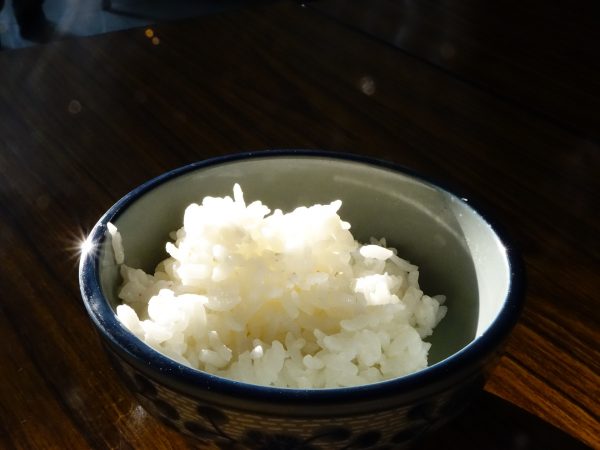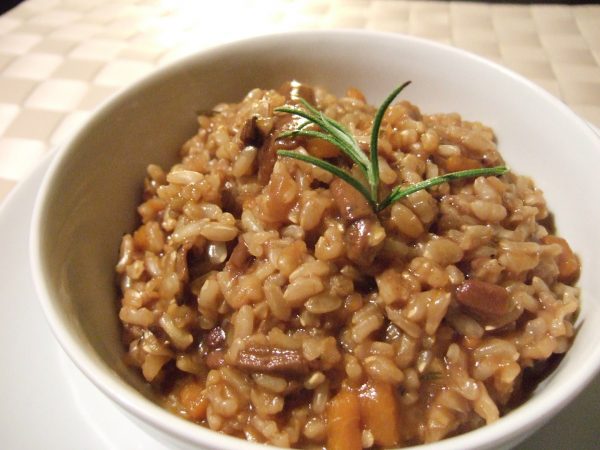
By Dr. Justin Marchegiani
Today’s talk is going to be on the truth about rice, white rice, brown rice. We'll talk about the pros and cons of each, and who may benefit from white over brown, etc. I get this question all the time in my practice and I had a patient bring this question up to me recently so I decided to make a video of it for everyone at home here.
So again, the truth about rice. Let's contrast. We have some of the attributes. The good and bad about white rice and also the good and bad about brown rice.
A couple of good things about white rice is it’s pretty easy to digest. It’s refined. A lot of the fiber and the germ are taken out so you pretty much just have the glucose portion of the rice. So it's easy to digest and a good source of carbohydrate.

Paul Jaminet would call it a safe starch, if you will. Higher in glucose, lower in fructose. This is important. A lot of Asian cultures for instance that consume lots of rice, they’re able to do even though it’s very high in carbohydrates. They do okay with that because the rest of their diet is relatively low in fructose.
So when we deal with carbohydrates, quick little thing–imagine this being your muscle belly right here. This is your muscle belly and this is your liver–so I’ll put an L for liver. When you take in fructose, 80% percent of fructose goes to the liver while the other 20% goes to the muscle.
Now this is actually flipped when we’re consuming glucose. It’s actually about 80% go to the muscle while only 20% go to the liver. So this is important because the muscles can hold about 350 to 400 grams of carbohydrate while the liver can only hold 60. So about 6 times more in the muscles than the liver. You get insulin-resistant faster when the carbs or when the sugar you’re eating goes to the liver over the muscles.
And so the nice thing about rice is it’s going to go over to the muscles over the liver. So if you’re a CrossFitter or someone who’s exercising a lot, doing high intensity interval training, lifting weights, it’s going to benefit you. You will be having a nice safer glucose source than fructose.
Next, the prolamin content is about 5%. So what’s a prolamin? Prolamins in the family of gluten. Rice is technically considered to be a grain and the family of gluten. Prolamins are the overarching family of proteins and if you look at the family of proteins in rice, it’s arginine, the content of prolamins is 5%. Whereas if you look at corn or wheat, you’re up in the 60-80% area.
So what that means is it's less protein. Less protein means it’s more hypoallergenic or less immunological activity from your immune system. That’s actually kind of a cross right there. A little more hypoallergenic and it’s easy to digest. Negative portion is white rice is an incomplete protein.
White rice is actually incomplete in lysine and it’s actually higher in your sulfur amino acids. So lysine’s really important especially with viruses, especially the oral herpes virus. It is very effective at knocking out the herpes virus but again incomplete in the lysine.
You want to make sure if you’re taking in rice, you pair it with for instance, legumes. Legumes will have the balance of the lysine. So you typically pair rice and legumes together. The only problem with that is you get about 80-90 grams of carbohydrates to 15 grams of protein. So the problem is you get a lot more carbohydrate, a lot less protein.
It depends on how carbohydrate-sensitive you are. If you are carbohydrate-sensitive and you can’t handle that much carbs, then this won’t be the best way to get your complete protein. It’d be negative and you’d be getting a little bit of lysine but a whole bunch of carbohydrates.
So what’s worse? If we’re choosing meat sources or animal sources, you don’t get almost any carbohydrate at all. Plus, you’re getting the full spectrum of the 9 essential amino acids, meaning your body can’t make it and lysine’s one of those.
For more information on the type of rice to eat or whether you should eat rice, click here!
Now this only matters if you’re doing really a rice protein because you have to get about 100 grams of carbs to get about 5-7 grams of protein. Not really good. Your typical post-workout shake is going to be about 20-30 grams of protein at a minimum. If you’re a bigger guy, maybe even 40 or 50, that’s 300 grams of carbohydrate. I won’t eat 300 grams of carbohydrate in 4 or 5 days. That's a lot of carbohydrate to be taking in.
If you’re doing a rice protein powder, then you can still get those sulfur amino acids. And if you combine the rice protein with pea protein, then you get the higher amount of lysine. It's because rice is higher in the sulfur while the pea is higher in the lysine. So if you combine the pea and the rice, you get both the lysine and the sulfur. Thus, it's a really a good winning team to go. Also, it's hypoallergenic not just from the prolamin standpoint, but also from the lectin standpoint.
So lectins are like mineral blockers. They block mineral uptake. Lectins and phytates. Lectins can irritate the gut, too. They are showing actually poke holes in some of the gut linings as well. Phytates are going to be your mineral blockers along with lectins, too. Because if you’re causing gut inflammation, you’re going to be decreasing vitamins and minerals. Not to mention they block enzymes. If we’re blocking enzymes, we’re not going to be able to break down protein as well. So it means decreased protein.
Again, everyone’s a little bit more sensitive. If you’re from an Asian persuasion and if you will and if you’ve had rice in your diet for a long period of time, you've adapted better genetically, then maybe that’s okay. If you have some gut issues, you’re already lower on your CBC and certain minerals, or have protein impairment, then you may want to avoid white rice. It's because of the lectins and the phytates and the enzyme blockers. So that’s white rice in a nutshell.

I’m going to go over to the whole beriberi thing first. Beriberi that’s a B1 deficiency and we typically would find a B1 deficiency in white rice. Higher B vitamins, that’s a good thing. One of the problems we have with white rice is a disease called beriberi. This is a condition that would affect the heart as well as the peripheral and central nervous system.
Brown Rice is actually higher in vitamins and minerals, higher in phosphorus, higher in magnesium, and higher in calcium. Whereas you don’t get so much of that at all in white rice. Maybe better if you don’t have an autoimmune condition. If you don’t have any gut issues or any autoimmune condition, or history of it, maybe brown rice is better for you.
Again, I don’t eat rice too often so I don’t worry whether mine’s white or brown. I’d rather just choose a sweet potato over that because I can get the glucose and the starch without all of the potential autoimmune things. I just try to stay away from grains in general because of my autoimmune thyroid.
If you have a little bit of autoimmunity, you’ve already healed your gut and you’re already doing pretty well on a healing path, maybe a little bit of some mochi rice or a little bit of rice every now and then may be good. I choose the sweet potato instead. It doesn’t cause beriberi. Now one of those things I just have a hard time wrapping my head around. How something can be good for you if it’s causing nutritional deficiency.
In the late 1800s, white rice was actually causing a condition called beriberi which is a deficiency in the B1 vitamin or thiamine. Beriberi stands for Swahili for “I can’t, I can’t”. And the reason why that came about that way is because the person’s heart would arrest. They would have heart failure essentially. It's an effect to the cardiovascular system and the nervous system. They found actually coming in and giving brown rice actually fixed the problem. This is because brown rice was higher in B vitamins, so it was able to fix that. So with the brown rice you get some increased B vitamins, also other vitamins and trace minerals may be okay if you don’t have much of an autoimmune risk factor. Also, it doesn’t cause beriberi.
I have a hard time again with people that are huge white rice fans. I have a hard time getting my head around eating foods that can actually cause nutritional deficiencies. Then you think, “Well, how does that happen? How does it cause a deficiency?” When you take in food to pump around the kreb cycle, which is how your body creates energy and ATP especially with carbohydrate, you pump around. And certain different parts of the kreb cycle, you need certain minerals and vitamins to do so. Typically food comes in with vitamins and minerals and you use less vitamins and minerals to process it; therefore, you have a surplus. But if food has none and it takes some to process, then now you’re in a deficit. Now you’re actually using vitamins and minerals, and that’s how you can actually have a deficit with white rice and cause beriberi.
80-90% of rice is going to be your insoluble fiber. So that’s the kind of fiber that adds bulk to your stool. Sort of a half a cup of rice and you get about 3.5 grams of insoluble fiber kind of like psyllium husk. And then 0.5 grams would be your soluble fiber.
I’m a bigger fan of soluble fiber because it helps bind up toxins, helps bind up hormones and junk. You’re getting more of the insoluble fiber so if you have gut issues. You may not do good with it because some people with constipation or Crohn’s or ulcerative colitis or gut issues, that type of fiber can cause irritation. Also, it can potentially even get stuck in the diverticuli and create some inflammation there. But again, like I already said, if you have autoimmune risk factors, you may want to just stay away from rice altogether.
So I kind of laid everything out for you, the pro and cons. If you’re having some gut issues, if you’re having some digestive problems, I strongly recommend keeping away from rice from the time being. And if you want more information about me and how I can help you with some of your health challenges, check below.
I have some awesome video series, newsletter, and just different ways to get in contact with me. And if you have any suggestions of a video that you would like me to do for you, feel free and email or reach out below.